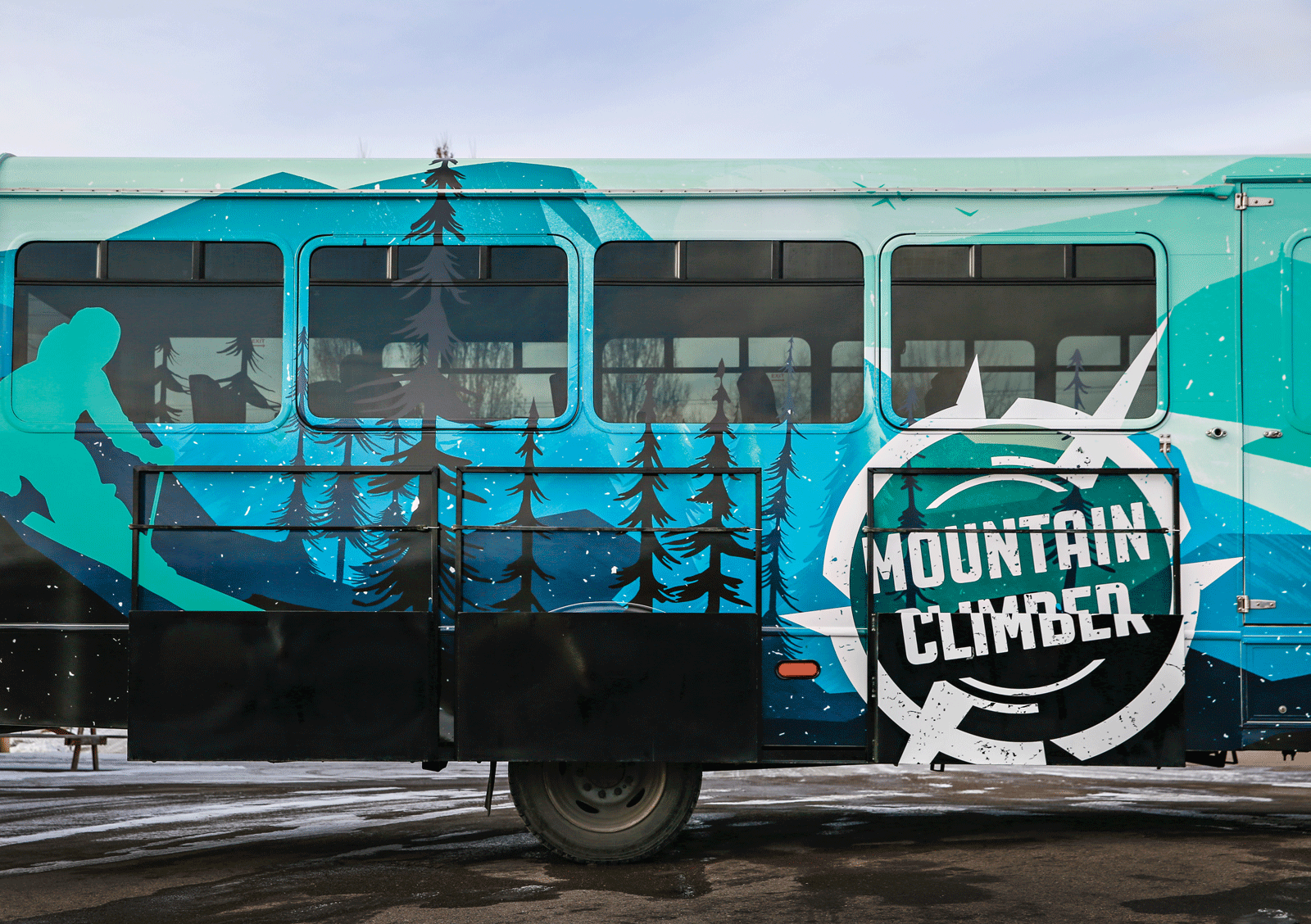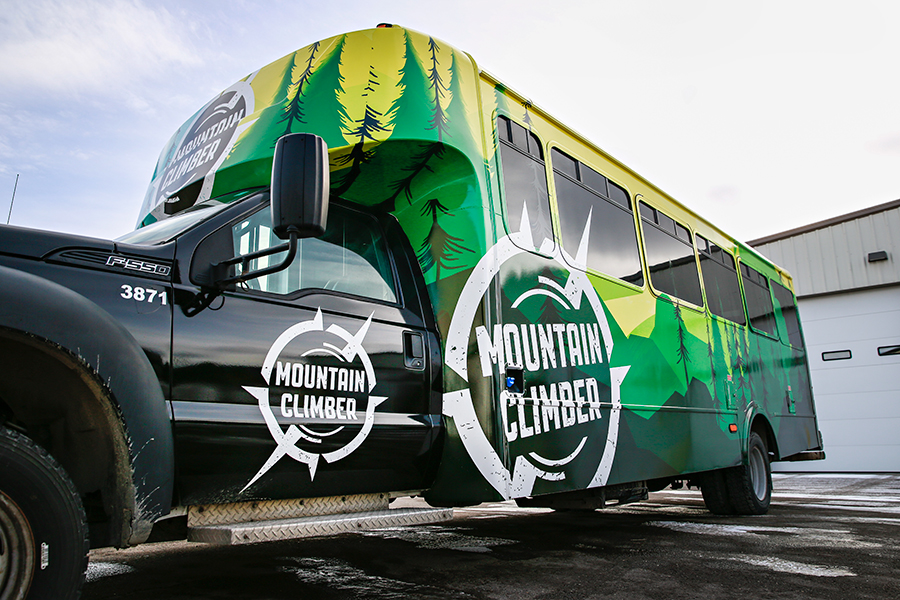Momentum Building to Restore Tri-City Commuter Transit
The City of Whitefish pledged to increase its funding for the Flathead County transportation network as the transit director eyes expanding city-to-city commuter service in the next year
By Micah Drew
When Elizabeth Wood first began working with Flathead County’s transit department in 2017, one of the biggest hurdles was getting the word out that a public network existed in the region.
“I noticed right away when I hit the pavement and visited with folks that most weren’t even aware it was in place,” Wood said. “So many people didn’t know we had public transportation, and back then we were called Eagle Transit and were associated mostly with elderly folks.”
In 2022, the county commissioners elevated Wood from her role as marketing director to run the entire department, which was plucked from the purview of the Agency on Aging to give it more autonomy. In addition, the county rebranded with a new name — the Mountain Climber — which saw the fleet of vehicles take on a bold, colorful new look in 2021.
All of these changes have worked in concert to boost the public profile and perception of public transportation in the county and has provided the momentum for Wood to begin planning for a new service in the valley — a much-requested tri-city commuter line.
Before the COVID-19 pandemic hit, the county ran a commuter line between Kalispell, Columbia Falls and Whitefish, but the system saw variable results.
“We could have 15 riders commuting on a slow day with two round trips going every morning and evening,” Wood said. “Times were not very user friendly for folks and it just wasn’t an ideal operation.”
However, Wood said a fixed route between the cities has remained the single most-requested service her department hears about from the community. “Whitefish residents are looking to get to FVCC for classes, Columbia Falls residents are looking to get to their jobs in Kalispell, and everyone wants to get to the airport. That’s the next thing we hear about the most. Then it’s getting to Glacier,” she said. “The reason we decided to start pursuing this again is because we decided the need is there.”
A survey put out by the department this spring garnered more than 300 responses, with 90% of respondents saying they’d utilize a fixed commuter route. Forty percent of respondents said they commuted between cities daily.
During a meeting of the Flathead County Commissioners in May, when the transit department’s budget was discussed, several members of the public spoke about the benefits of expanding public transportation in the valley.
“Commuter service is very important. It provides that equity to people who don’t’ drive or don’t have access to cars,” Whitefish resident Robin Paone said. “It’s also an economic benefit to our county because it gets those workers to places they can’t afford to live, like Whitefish. It’s also healthier, because you’re walking to catch the bus or complementing it by taking your bike along.”
Brian Schott, also of Whitefish, added that a recent resident survey conducted in the city pinpointed traffic and congestion as one of the main issues for locals, which could be eased through mass transit. “There’s a plethora of reasons why an expanded commuter service will help connect the cities,” he said.
The county declined to move forward with expanding the service this year, expressing doubts about whether a rural county has the population base to make a commuter line work and saying they would like to see buy-in from all three cities before they commit additional county funds.
“For me, we’re doing a great job with what we’ve got. We’ve got a great app for our on-demand system, and when there’s a need for a ride, we’re there,” Commissioner Randy Brodehl, who sits on the county’s Transportation Advisory Committee, said this week. “I know people want something that allows travel between cities, but right now I want to focus on making what we have work well. We’re still a rural community, we have to fit within our budget and within the needs of our community.”
“We’ve got to keep our focus where it is,” he added. “I think the transit system, as a hybrid rural system, is functioning. I don’t want to take on one more thing.”

Currently, the Mountain Climber operates almost primarily as an on-demand service within the boundaries of each of the three cities. There is a single commuter trip from Kalispell to Whitefish each morning that returns in the late afternoon, and one that runs from Kalispell to Columbia Falls each morning, with a mid-afternoon return.
Wood is proposing a future expansion that will run between all three cities, either as a loop, or as two separate routes configured as a Kalispell-Columbia Falls line and a Kalispell-Whitefish-Columbia Falls circuit that connect at a depot in Columbia Falls. The proposed routes would run from 6 a.m. to 10 a.m. and from 3 p.m. to 6:30 p.m., and include 12 stops at Glacier Park International Airport. Rider fares would be set at $1.
“This would open up the zone between Columbia Falls and Whitefish, which we think would be heavily utilized,” Wood said. “With limited resources we want to be intentional and spend them in a way that best benefits our community members.”
A conservative estimate of the commuter expansion’s cost is $560,000, which would be split between the three cities, Flathead County, and would include state funding which would amount to roughly half the overall cost.
The city of Whitefish is already on board. Wood presented her proposal before the city council in May and, by the end of the meeting, a motion to contribute $60,000 towards a pilot expansion program had passed. Wood delivered a similar presentation to the Kalispell city council earlier this month.
“Every municipality is different and has different goals and different financial situations,” Wood said. “But residents in all three cities have said they want this.”
If all three cities agree to support the pilot program, and Wood receives the go-ahead form the county commission, she thinks it could be possible to launch in late 2025.
“Just because people want the service and say they’ll use it, we really have no way of knowing if they actually will,” Wood said, adding that the more city councilors and the county commission hear from their constituents, the better they will understand the need for the service. “We just have to put a service in place and then put our best effort into encouraging people to use it.”